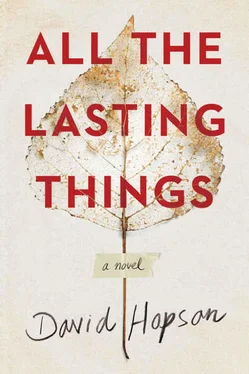How many men in a thousand million… reach Z after all? Surely the leader of a forlorn hope may ask himself that, and answer, without treachery to the expedition behind him, ‘One perhaps.’ One in a generation. Is he to be blamed then if he is not that one? provided he has toiled honestly, given to the best of his power, and till he has no more left to give? And his fame lasts how long? It is permissible even for a dying hero to think before he dies how man will speak of him hereafter.
But reading, at least in front of the doily-collared Judge Sheindlin, was a losing battle. He watched two more cases with a vacant stare, as pleasantly glazed-eyed as fledgling sobriety allowed, and made it halfway through a third — inept wedding planner, deplorable bride — when the doorbell rang. From the kitchen, Evelyn called out that she’d get it, but Benji shouted back, thunking across the tasseled carpet as quickly as he could and throwing open the door. The man standing on the mat lunged forward without so much as a hello and took Benji into his arms.
“Roger?” Benji croaked.
Roger Fitch held on to his godson for a good minute, too grateful (to judge from the crush of his embrace) that Benji was actually there to hold on to. When the hug wound down, he stepped back, taking Benji by the shoulders, assessing him. “Benji, my boy,” he said brightly, “you look like I popped your balloon.”
Roger was a small man, daintily built, with a pronounced gap between his front teeth and ears that stuck out from his immaculately shorn head with elfin prominence. Physically, he looked less suited to building the careers of literary giants than to cobbling their shoes or tinkering with their watches, but Henry (and, according to Henry’s math, at least five other decorated scribblers) would have been digging ditches without him. His writers called him Leo or, when they felt like driving the point home, Napoleon, for though he stood barely tall enough to ride most roller coasters, there was something undeniably magisterial about this son of a grocer from Canarsie, the product of public schools and city colleges, who, despite (or maybe because of) his humble origins, understood the appeal of world domination. To see Roger hammering out the details of a subrights contract or poaching an author from an agency twice the size of his own was to watch him grow a foot before your eyes.
“You were expecting someone prettier,” Roger said, cutting off Benji’s apology with a solid, avuncular pat on the back. At least once a year, in the heyday of Henry Fisher’s career, Roger could be counted on to materialize at this very door, contracts for Henry in one hand, Zabars for the rest of the Fishers in the other. He made it known that it wasn’t a trip he enjoyed making — the few charms of upstate New York that he could name (camping, cow tipping) held no appeal for him — but Benji, who used to race to his car like a bounding dog, ranked high among its consolations. He dropped his bags at his feet and gave his godson another hug.
Roger was, like many a well-heeled Manhattanite, hopelessly provincial; everything he could ever want ranged on an island thirteen miles long. Should he ever need a face-to-face with one of the few non — New York — based writers he represented, he insisted they bring their business to him, the indignities of traveling beyond Brooklyn being a form of penance for living in Eugene or Princeton or some other godforsaken land. To this rule, he made two exceptions. In 1965, at the age of thirty, Roger Fitch packed up his desk at one of the country’s leading literary agencies and took with him two young writers nobody at Curtis Brown thought to miss. The first was E. Pritchett Moon; the second, a twenty-seven-year-old construction worker who’d written his first novel in a tiny apartment alongside his boss’s garage. Edwin, author of what turned out to be an endlessly proliferating saga of randy warlocks, earned him money, vast sums of it. Henry, who continued hanging drywall until his third novel won him the National Book Critics Circle Award, earned him respect.
“Did my father know you were coming?” Benji asked.
“You know me, Benji. I don’t leave the fortress unless I’m summoned.”
“Yeah, but does he remember summoning you?”
“He remembers fine,” Henry said, suddenly behind them, surprisingly stealthy on his stocking feet.
“There’s nothing wrong with his hearing.” Roger winked before walking off to clasp his old friend’s hand.
The buzz finally drew Evelyn out of the kitchen. She hurried down the hallway, wiping dish suds on her flowered robe. “Roger? What on earth?” She opened her mouth and laughed, somewhere between charmed and offended by the surprise. “Henry didn’t,” she began, then, reconsidering, leaned in for a conspirative hug. “I could kill him. Look at this place. Look at my hair.” She pulled her robe more tightly around her and sourly cinched the belt.
“He’s not here to check if the pillows are fluffed,” Henry said, starting back toward the kitchen. “Let’s go, Leo.”
Roger offered Evelyn his arm and followed along. “Don’t worry about your hair, Ev,” he said, polishing his shining head like Aladdin’s lamp. “Look at mine.”
Evelyn carved the babka and set it on the table with a stack of small plates, while the men poured the morning’s leftover coffee — Roger insisted that Evelyn go to no trouble — and settled into opposite chairs. Benji, more curious than hungry, lingered in the doorway, picking lazily at a slab of sugar-tarred dough.
“You’re wondering why I called you here.”
Roger spread a napkin over his knee and smiled at the lack of grace he’d come to see as the larger part of Henry’s appeal. “Nary a hello,” he said, laughing. “Henry, my friend, nowadays doctors would place you on a spectrum of some sort. Is it a mild form of Asperger’s or a signature brand of cantankerousness that makes small talk so unthinkable?”
“Well, tell your doctors to get in line behind mine, who have plenty of diagnoses of their own.”
“Which you’re absolutely going to tell me all about,” Roger answered. “But first”—he turned an empty chair in Benji’s direction and motioned for Benji to sit—“I want to hear from this one.”
“Benji?” Henry balked. “Benji’s fine.” But Roger’s level stare proved too much for even Henry’s obdurate nature, and he waved his agent on like a man who’d ignored his sound warning and insisted on driving down a dead-end street.
They waded into the conversation slowly, between sips of coffee and observations about a Republican senator’s crush on Ayn Rand, but as soon as Leo asked the inevitable question—“What was going through your mind?”—Benji’s monologue started up. It now played like a song from a jukebox, easily, automatically, drop a quarter in the slot and out it came. In the constant retelling, he’d worked the blur of that strange August night into a finely focused tale of drunken desperation, the climax of which had been years in coming. He fashioned himself as more determined than mere accident allowed, showing them his damage but also something that he himself had lost sight of long ago: his depth. What else was he hiding if he could hide such despair? Each retelling of the story poured like molten steel into this new mold, into a new Benji, whose form was more impressive, whose qualities — the despondency that pulled him down, the strength of will that lifted him up — gave rise to a more monumental man.
Evelyn, still unable to contemplate the state of mind that led her son to attempt a suicidal leap, turned back to busy herself with the dishes while Henry sat quietly by. At the end of Benji’s monologue, Roger reached for his godson’s hand and squeezed.
Читать дальше












